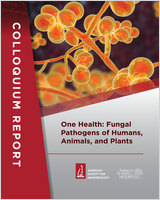From: One Health: Fungal Pathogens of Humans, Animals, and Plants

One Health: Fungal Pathogens of Humans, Animals, and Plants: Report on an American Academy of Microbiology Colloquium held in Washington, DC, on October 18, 2017.
Washington (DC): American Society for Microbiology; 2019.
Copyright 2019 American Academy of Microbiology.
This work is licensed under a Creative Commons Attribution-NonCommercial-NoDerivatives 4.0 International License.
NCBI Bookshelf. A service of the National Library of Medicine, National Institutes of Health.